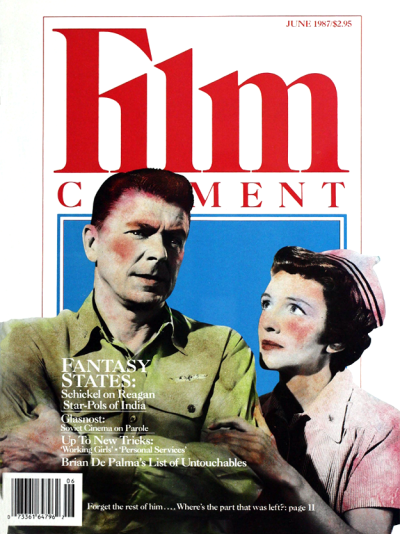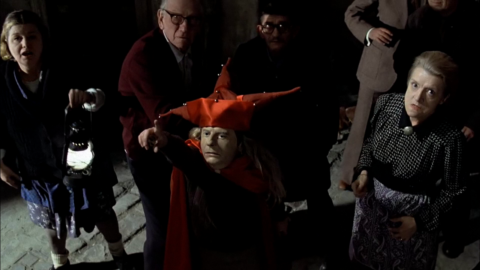FANTASY STATES
Used to be a schoolboy lesson that taught when the country heads for fantasyland, head for the hills. Ronald Reagan never had to know how GE was doing, so why on this site—the White House—do we lean? Richard Schickel documents RR’s penchant for political astral projection—the Eighties equivalent of his Hollywood dreamwork. And J. Hoberman and Chidanada Das Gupta detail the Indian movie stars who have parlayed their careers into governorships or seats in Parliament and figure if Reagan could rise, Rajiv had better run for it.
WORKING GIRLS
It’s been easier recently to go see a celluloid hooker—who just happens to be your kid sister on break from social work school—than it’s been to find a real brothel under a red light and with a leg dangling out a window. Karen Jaehne tells us two or three things we know about the spate of new working girl films.
MIDSECTION: GLASTNOST
The key, Comrade Gorbachev says, to the new Soviet Union suddenly is on everyone’s lips: glasnost. Openness. And nowhere is it more central to policy than the arts. So the shelves have rained down forbidden films and the heavens produced new proposals that tempt Stalin’s ghost. Harlan Kennedy calls it the International Word of the Year and mulls its possibility, then thinks aloud about the life and films of Andrei Tarkovsky. Bob Strauss caught up to the Soviet artists, writers, and bureaucrats who came courting American colleagues and coproductions (page 37). Brenda Bollag puts an appreciative eye on problem films, among them Farewell, started by Larissa Shepitko and finished by husband Elem Klimov, glasnost’s new head of the filmmaker’s union. And Soviet émigré writer Alexander Batchan prompts Soviet critic and Filmmakers Union secretary, Victor Oyomin, to speak openly about the reel that has just come full circle.
JOURNALS
The 37th Berlin film festival provoked wild things to emerge from world filmmakers, and our mild things, Harlan Kennedy and Amos Vogel, rattle their cages.
DE PALMA’S DELECTABLES
Brian De Palma’s guilty pleasures? This is like listening to a shrink and a neurosurgeon talking shop over a lunch of blood sausage at the Melody Burlesk. More organ music, please.
MIKE THE MOGUL
He’s nice, he cares, he wants a missile freeze, and he leaps over tall bildungsroman in a single bound. Orion star Mike Medavoy tells Anne Thompson how he plotted his way to the top of production execs and kept a low profile.
NEW DIRECTORS/NEW FILMS
The day after the Day the Earth Went Bang, some historian will unearth Armond White’s and Marcia Pally’s reports on the 16th New Directors/New Film series, and know why.
PENSEES: FAKE MONEY
You hadda be deader than a cue ball to be disengaged from Marty Scorsese’s interior monologue in The Color of Money. He’s back, all right, but his critics missed how and why, says hustler Jimmy McDonough. Rack ‘em, Fats.
TV: THE REBBE’S REACH
Lubavitcher rabbi Menahem M. Schneerson doesn’t live in a theme park, doesn’t promise a ticket to heaven, and doesn’t demand eight squadrillion dollars—or else. His cablecasts take Hasidic Jewry from its 18th Century roots into 21st Century orbit, Brooklyn-style. Marcia Pally ponders his fundamental pull.
BOOKS
Robert Coover’s A Night at the Movies poked Lawrence O’Toole in his reviewer’s ribs: only this witty novelist remembers why Ilse twinkled so in Casablanca.
BACK PAGE: QUIZ #25





